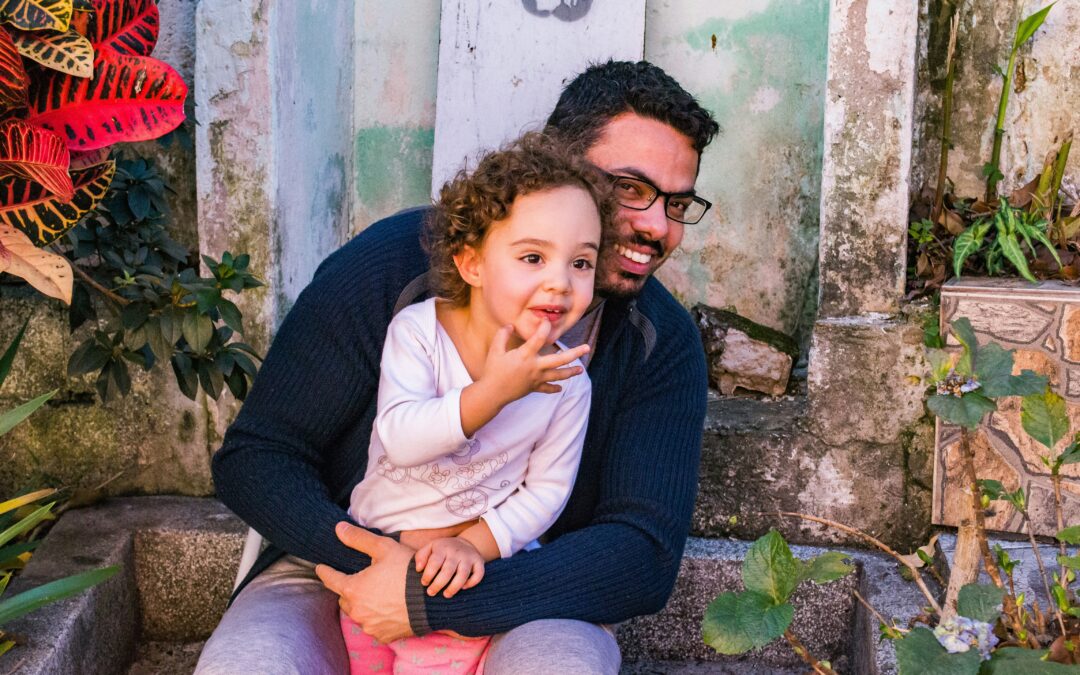In my last blog post, I introduced you to Dr. Michelle Watson Canfield, PhD, one of my dear friends and a fellow therapist who happens to be an expert on the subject of fathering — particularly, father-daughter relationships. I shared some excerpts of a recent conversation I had with Michelle, and we kicked things off by talking about why dads matter so much in shaping their children’s lives.
In this next piece of our conversation, Michelle and I dig into the evolving role of fathers in nurturing emotional bonds with their children and actively engaging in their emotional lives. This discussion resonated deeply with me, echoing themes from our earlier exploration of fatherhood.
As therapists, we witness firsthand the profound impact of paternal involvement. My (Sabrina’s) reflections on my own sons transitioning into fatherhood underscore a positive shift towards greater emotional attunement and connection among the next generation of dads. Michelle expands on this by highlighting the spiritual dimension of fatherhood — how fathers can serve as a tangible representation of God’s unconditional love and grace to their children.
And if you’re not religious, that’s okay! This is still for you. We all need to feel loved unconditionally.
Drawing from biblical wisdom, Michelle references Luke 15 to outline practical steps for all fathers to foster deep, meaningful relationships with their daughters, regardless of what their spiritual lives look like.
Let’s jump in!
Sabrina: You know, as we talk about the profound influence of fathers in the lives of their kids, I think about my sons who are now daddies. They’re learning to be more emotionally attuned, connected, and softer — with their daughters and sons! It makes a huge difference in how their children behave.
And as the Gottman research shows, men feel almost as much as women do; it’s just that many men are not taught how to access or express those feelings. But I see the evolution of men’s emotional intelligence happening right in front of me. When they get better at accessing their own emotions, they can better access the emotional hearts of their children.
Michelle: Absolutely. It increases that attachment, that healthy, secure attachment. And then let’s even add one more thing to that.
(Welcome to us as therapists and women—we’re always adding something, right?)
In the end, Dad, you’re helping to build a bridge to God as your children’s father.
Many men might feel disqualified from that task due to their past mistakes or feelings of shame. But the truth is, as fathers, we have a unique opportunity to show our children a glimpse of unconditional love and steadfastness.
Even Isaiah describes it beautifully — God has her name tattooed on his hand. It’s such a powerful image of everlasting love and presence.
And we learn one of the practical ways to embody this kind of steadfast fatherly love in Luke 15, where Jesus outlines how a father patiently waits and welcomes his child home, without judgment or condemnation. The father doesn’t go running after him to try to block him from making stupid decisions and unwise choices. Instead, the father says, I’m going to stay here and look for him when he comes home.
That story of the Prodigal Son offers a clear action plan for dads. Are you actively looking into your daughter’s world? Do you know her friends? Are you watching things with her, seeing what she sees? Engaging with her on her terms is crucial.
Help her to know that you’re not there just to criticize her but to look through her eyes at what matters to her, what hurts her. (And side note, dads: you’re gonna have to expand your capacity to sit and listen. That’s why we have two ears and one mouth, to listen more.)
Seeing her, really seeing her is Step #1. Step #2 is to run toward her.
Sometimes, you’re going have to initiate moving forward. Some dads get discouraged over time, feeling like they’ve been knocked down too many times. I understand that. But you’ve got to get up, and you have to pursue her because that’s what a father does.
It’s all about initiating and running towards your child, just as God as a father pursues us with unwavering love.
Step #3 is about building with compassion — replacing lectures with understanding and support. Imagine the impact of wrapping your child in a metaphorical embrace of acceptance and love.
Like you said, Sabrina, it’s about activating that softer, more tender part of you. It’s there. Tap into it.
Now, Step #4 can be a tricky one. You’ve got to embrace your daughter. Give her a kiss now and again. Some dads might feel uncomfortable with physical displays of affection, but it’s about conveying that deep, unconditional love that speaks louder than words. If it helps, think of a dog running up and kissing your face with unconditional affection — a heartfelt, enthusiastic gesture that says, “you’re here! I love you just the way you are!”
Show her that. However she needs to see and feel it.
I want to echo the importance of understanding and supporting children without judgment, emphasizing the power of compassionate listening and genuine engagement. Michelle really gives us a nugget of wisdom there!
This part of my conversation with Michelle further highlighted how fathers can play a pivotal role in their children’s emotional development, regardless of their spiritual beliefs. By embracing these principles of emotional connection and compassionate parenting, fathers can build lasting bridges that enrich their children’s lives and nurture strong, secure attachments.
To all fathers reading this, we encourage you to strive to cultivate environments where love, understanding, and acceptance flourish abundantly. Embrace the opportunity to deepen your connection with your children. Your presence, love, and willingness to understand and support them unconditionally will leave an indelible mark — an enduring legacy that resonates in their hearts long after they’ve grown.
Photo by Jonas Kakaroto on Unsplash


